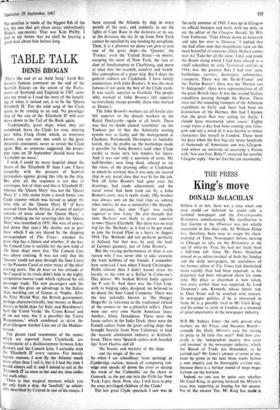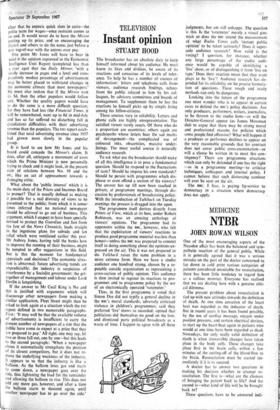King's move
THE PRESS DONALD McLACIILAN
Believe it or not, there was a time when one man could—or believed he could—edit a national newspaper and the Encyclopaedia Britannica simultaneously. My recollection is that Garvin at the Observer was not wholly successful in this dUal role. Sir William Haley has, therefore, been wise to resign his chair- manship of Times Newspapers before moving to Chicago to take on the Britannica at the age of sixty-six. True, his had not lately been a full-time job. Since Mr Denis Hamilton moved in as editor-in-chief of both the Sunday and the daily newspapers, the usefulness of the former editor of The Times had diminished more rapidly than had been expected; so his departure had been whispered about for some time. His place as chairman is now taken, two years earlier than was expected, by Lord Thomson's son, Kenneth, whose future role in Fleet Street will be watched with interest. In newspaper politics, if he is interested in them, he is a possible rival to Mr Cecil King; and he comes to settle in London at a moment of great uncertainty in the newspaper industry.
Will Mr. Aubrey Jones—the only person who matters on the Prices and Incomes Board— concede the Daily Mirror's case for raising its price to 5d later this year? And how pre- cisely is the 'independent inquiry into costs and revenue' in the newspaper industry, which the Board of Trade has demaixled, to be carried out? Mr Jones's answer, it seems to me, must be-given in the next three weeks before a new inquiry can be thoroughly carried out; because there is a further round of wage nego- tiations on the horizon.
Indeed, no one can be quite sure whether Mr Cecil King, in putting forward the Mirror's case, was expecting or hoping for the answer No or the answer Yes. Mr King has made it
clear that he expects quick rises in costs—the polite term for wages—once restraint comes to an end. It would never do to have the Mirror putting up its price, and so encouraging the Sketch and others to do the same, just before a new tug-of-war with the unions over pay.
One point Mr Jones will have to bear in mind is the opinion expressed in the Economist Intelligence Unit Report (completed less than a year ago) that the Daily Mirror, 'with a steady increase in pages and a level and com- paratively modest percentage of advertisement may be better placed to withstand changes in the economic climate than most newspapers? He must also reckon that if the Mirror won its 5d, then the other populars would follow suit. Whether the quality papers would have to do the same is a more difficult question; for they have had less (the Financial Times, it will be remembered, went up to 8d in mid-July and has so far suffered no disturbing fall in circulation) difficulties with their advertising revenue than the populars. The Fiu report estab- lished that total advertising revenue since 1957 had grown most slowly in the popular group.
It is hard to see how Mr Jones and his board could concede the .Mirror's claim. It does, after all, anticipate a movement of costs which the Prime Minister is now personally trying to check and it might look, in the present state of relations between No. 10 and the IPC, like an act of appeasement towards a damaging critic.
What about the 'public interest' which it is the main duty of the Prices and Incomes Board to protect? That is usually defined as making it possible for a real diversity of views to be presented to the public; from which it is some times inferred that no national newspaper should be allowed to go out of business. This argument, which I suspect to have been specially devised to protect the Guardian and Sun from the fate of the News Chronicle, leads straight to the ingenious plans for subsidy and tax relief which were ventilated earlier this year. Mr Aubrey Jones, having told the banks how to improve the running of their business, might be tempted to offer suggestions in this field. But is this the moment for fundamental appraisals and decisions? The economic situa- tion is abnormal; future advertising trends are unpredictable; the industry is suspicious - of interference by a Socialist government; the get- together of management and labour under Lord Devlin is languishing.
If the answer to Mr Cecil King is No and this is justified with arguments which will discourage other newspapers from making a similar application, Fleet Street might then be asked to look again at a situation which the EIU report defined in two memorable paragraphs. First: 'It may well be that the available volume of advertisements is insufficient to carry the present number of newspapers of a size that the public have come to expect at a price that they are prepared to pay.' All right, one may say, let two or three fall out, one by one—but this leads to the second paragraph: 'When a newspaper closes it automatically strengthens the position of its closest competitors, but it does not re- move the underlying weakness of the industry. It appears to us that the industry is like a balloon. As the balloon loses gas and starts to come down, a newspaper goes over the side, thus lightening the load for the remainder and allowing the balloon to rise. This does not add any more gas, however, and after a time the balloon starts to descend again, until another newspaper has to go over the side.'







































 Previous page
Previous page